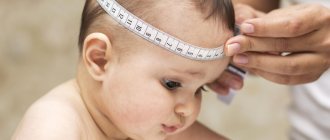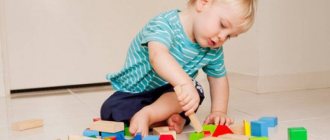Routine
Every day of your baby should be carefully planned. This will not only make your life easier today, but will also help your child in the future. For example, establishing the correct hours for eating, sleeping, resting and walking can have a beneficial effect on the fact that when the baby comes to kindergarten, it will be easier for him to adapt to the regime there. Some mothers, thinking about this in advance, find out what the daily routine is in preschool institutions. Based on these readings, they create a daily routine for their child.
Table with possible mode
| Time | Daily regime |
| From 8 a.m. to 9 a.m. | The baby wakes up. Mom washes him and offers to brush his teeth. It’s good to do morning exercises at this time. |
| From 9 am to 9:30 am | The child is having breakfast. |
| From 9:30 am to 10:30 am | The baby can take a nap. |
| From 10:30 am to 11 pm | The child may have a snack. Although some children have already given up this meal. |
| From 11 a.m. to 12 p.m. | Devote time to your baby's mental development. |
| From 12 noon to 1:30 pm | You can go outside. |
| From 1:30 pm to 2 pm | The baby has a hearty lunch. |
| From 2 pm to 4 pm | The child can go to bed. |
| From 4 pm to 4:30 pm | Offer your child a snack. |
| From 4:30 pm to 6 pm | Go for a walk with your child. |
| From 6 pm to 7 pm | Devote time to physical and intellectual exercise for your baby. |
| From 7 pm to 8 pm | Carry out water treatments and massage your little one. A little gymnastics is possible. |
| From 8 pm to 8:30 pm | Get your baby ready for bed. |
| From 8:30 pm to 8 am | The baby is sleeping. |
Baby's sleep time day and night
Doctors advise adhering to an adequate daily routine, tailored to the needs of a particular baby. Then the baby will sleep without problems, and parents will not have any thoughts on how to improve their child’s sleep.
Children in the first or second month of life after birth sleep almost all the time. Wakefulness consists of feeding, bathing and a short period of cognitive activity (communication with mom, massage, etc.). Up to a year, the period of wakefulness increases rapidly.
For 1-2 months for babies with low body weight, such a feeding schedule is considered adequate, in between which the child rests (2-2.5 hours):
- 6.00-9.00-12.00-15.00-18.00-21.00-24.00 (at night meals are provided upon request - at 03.00).
For full-term infants, the following meal options are suggested (each sleep period lasts about 3 hours)::
- 6.00-9.30-13.00-16.30-20.00-23.30 (at night meals are offered on request - at 02.30).
Diet
Children have five meals a day, but more often they have four meals a day.
The intervals between the baby sitting down to eat are approximately 4 hours.
Since most babies already have a few teeth by the age of one and two months, it would be logical to introduce solid foods. Don't worry that your baby won't be able to handle it.
Try to refrain from eating sweets.
An approximate menu for a baby at this age:
- First meal. It is possible to give porridge, but do not grind it until smooth. Vegetables or half an egg are served as a snack. You can drink, for example, tea.
- For the second meal, it is advisable to give your baby soup (vegetable or meat). For the second, vegetable salad. The baby can record everything with compote.
- For the third meal, you can give your child cottage cheese with added fruit. Give a few cookies for a snack. Wash everything down with juice.
- The fourth feeding should be light so that it does not interfere with the baby's normal and full sleep. You can offer your baby fruit puree or just pieces of chopped fruit.
Causes of restless sleep
But babies aged 1-2 months do not always sleep peacefully. The causes of a child’s sleep disorders can be hidden, both in the environment and inside the child’s body.
In infants, dreaming consists of two periods - slow and fast. During the first phase, the infant sleeps soundly, the sleep is very deep, and it is much more difficult to wake the baby.
During the second, which takes up most of the time, the newborn baby sleeps more superficially. During this period, new neural connections are formed in the central nervous system, all organs and systems of the body are actively working and developing.
Dr. Komarovsky considers it normal if the baby occasionally pushes in his sleep, makes sucking movements, makes quiet sounds, moves his arms and legs, sometimes trembles and may cry out.
The problem is if the child wakes himself up during these actions and, as a result, does not get enough sleep. All care for a newborn is disrupted if the baby has restless sleep.
External causes of concern may be:
- Microclimate disturbances in the children's room (temperature more than 24 degrees C, humidity less than 70%) - the child is too hot and will wake up from thirst;
- The presence of constant irritants around (bright lights, loud speech, vigorous activity of adults).
Internal reasons:
- Increased gas formation and abdominal pain;
Sometimes indigestion and gas in the intestines wake up children. At the same time, the child strains and grunts, and his tummy may increase in size.
Before feeding, place the baby on your stomach for a few minutes, and after eating, let the baby remain in an upright position in his mother’s arms for at least 10-15 minutes. Let your baby drink more water
- Rhinitis;
Snot during ARVI is a common cause of insomnia in infants, since the baby’s nasal passages are very small and any problems in the nose cause breathing difficulties.
- Increased excitability of the nervous system.
This is the most common answer to the parental question “Why does a newborn shake in his sleep?” If the baby twitches very actively in his sleep, and also moves his arms and legs, then it is recommended to swaddle the baby lightly (classical music is also very calming)
- Malnutrition.
If the mother does not have enough milk and the baby does not receive enough food when breastfeeding, he has difficulty falling asleep. You should be alarmed if a child sucks very actively in a dream, and in addition, does not gain weight well.
If a child constantly screams in his sleep, it is advisable to show him to a pediatrician. A baby who screams in his sleep is suffering from some kind of regular pain and needs to be examined.
If your child moans in his sleep, first of all check whether he is sleeping in a comfortable position and whether your baby is warm enough. If everything is fine with this, and the child continues to moan intensely, without delay, show him to the doctor.
How long should a newborn baby sleep?
Games with a child aged 1 year and 2 months
It is important that all kinds of toys are present in a child’s development. Today, manufacturers offer us a wide range of such products. Don’t forget to play with your child not only with toys, but also with games, such as what’s hidden in the saucepan, lotto, hide and seek.
From early childhood, I organized staged performances for my son using toys that could be put on his hands. It's like a puppet theater. When the child was one year and two months old, the son began to perform the show on his own. Of course, he didn’t know how to talk yet. However, this did not stop him from babbling in his own way. Therefore, such performances were very funny.
Tip of the month
If your baby has a very difficult time transitioning from two sleeps to one: the child takes a second nap in the late afternoon and, as a result, goes to bed too late at night, taking a long time to get to bed, you should introduce a flexible daily routine. Don't worry if some days you have one nap and others you have two. This is a completely normal situation during the transition period, it is temporary and soon the sleep pattern will finally take shape.
Don’t force things, put your baby to bed when signs of fatigue appear and avoid overtiredness. Seek advice and help from sleep consultants if you find it difficult to independently choose the optimal sleep routine for your child during this difficult period.
Tatyana Chkhikvishvili Sleep consultant, BabySleep Center for Children's Sleep and Development
Walks
As before, they take up most of the child’s day. Mom should understand how useful it is to go outside the apartment. The baby can not only breathe fresh air, but also take sunbathing. And what is important is that the child communicates with his peers and acquires social skills. It is worth understanding that in the sandbox the baby will meet not only his peers, there will also be older children there. And this will have a beneficial effect on the development of your baby’s speech apparatus.
Bathing and hygiene
- Taking water procedures is no longer a daily event. Now the baby can bathe 3 times a week. Although it is recommended that on days when he does not take a bath, he at least takes a shower. This is especially true during the hot season.
- The child should already know that after he wakes up, he needs to brush his teeth and wash his face.
- The baby is one year and two months old and is already sitting on the potty independently. Mom can gradually teach him that after defecation he needs to wipe his butt.
- It is still important to clean the baby’s nose and ears, but you should not do this more than 3 times a week, or better yet, twice.
- It is important to teach your baby to comb his own hair, wash his hands before and after eating, and wash his face.
Sleep is the most important function of the body
Somnologists emphasize the vital need for adequate sleep for any person. However, it is most important for the timely physical and emotional development of a small child.
According to pediatricians, with a properly organized regime of wakefulness and rest, children grow faster and their metabolic process accelerates.
Healthy sleep protects babies from the negative consequences of life around them: stress, illness, separation from their mother - from everything that can negatively affect their fragile health.
Pediatric doctors say: “When a baby sleeps soundly, he produces special proteins - cytokines, which are involved in the body’s response to infections and stress.” This is why it is so important to monitor the quality and duration of infant sleep.
For your information! When creating an individual “sleep” schedule for her child, a mother should take into account that newborns sleep on average 18 hours a day. By the age of one year, the duration of a child's sleep is reduced and is already about 13 hours, as the baby's activity increases and the time spent awake increases.
Physical exercise
At one year and two months, physical activity is still of great importance. Therefore, you should try to do such exercises in the morning. But don't be upset if your baby is categorically against these actions. At this age, children are already quite active and mobile. Therefore, the baby will receive a certain amount of physical activity during his games. But the normal development of the musculoskeletal system is still important. Therefore, it is still worth doing gymnastic exercises with your baby, at least from time to time.
So we got acquainted with what the regime of a child should be at the age of one year and two months. Parents must understand that a timely daily routine, as well as timely instillation of these rules in the baby, contribute to the normal development of the baby. It is the presence of a routine in a child’s life that will not only teach him discipline in adulthood, but will also help him adapt more easily in kindergarten.
Features of sleep up to 1.5 months
Young parents often think about how much sleep a baby should sleep at 1-5 months. There is no single norm at this age, because each baby is individual. It all depends on the baby’s health condition. Premature and weak children sleep longer than those born without congenital defects or diseases. Pediatricians identify the following sleep characteristics for up to one and a half months:
- The baby cannot sleep for more than two to three hours at a time and often wakes up;
- The child falls asleep easily and wakes up just as easily;
- During the waking period, the baby mainly eats;
- If the schedule is incorrect, the baby may confuse day with night; such cases are not uncommon.
In order for your baby to sleep soundly, you need to take him for walks more often and bathe him daily before resting at night. Baths with medicinal herbs (for example, chamomile) contribute to good sleep. If a child stays awake for a long time due to intestinal colic, which is common, the pediatrician may prescribe a drug to help normalize digestion. Another common cause of sleep disturbance is diaper rash. In this case, you should use special children's cosmetics to solve the problem.
Attention! In the first month and a half of life, the baby often wakes up to be fed and cannot sleep all night without interruption. This is quite normal; a healthy baby, after eating, falls asleep again. The number of night awakenings may vary.
Sleep norm for children 3-4 years old. Day and night sleep
Children aged three and four years old have a daily sleep requirement of 10–12 hours. The share of daily breaks is one and a half to two hours. Some children do not rest during daylight hours. Rest deficit accumulates. The task of parents is to increase the duration of nighttime dreams to compensate for the missing time.
At the age of 5–7 years, dreams are divided into daytime and nighttime. The former are no less important for the harmonious development of the baby than the latter. As you age, it becomes more difficult to put a fidget to sleep during the day. Parents should not raise their voices or force. You need to tell why children sleep during the day. Come up with a story about how the main character slept, ate well, and coped with all adversity. Create optimal conditions for comfortable dreams.
Maintain the necessary microclimate in the bedroom (humidity 50-65%, temperature 19-21 degrees), lighting brightness. Evening walks and active pastime are required. A quiet, calm atmosphere, a cozy environment helps you fall asleep as quickly as possible. Read your favorite fairy tale to your child, recite a poem, or play an audio recording. Use the above methods not only during the day, but also in the evening.










